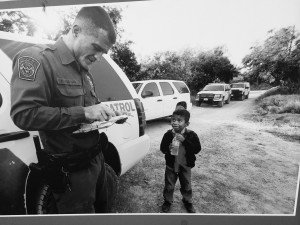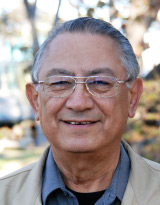The January Encuentro is a required three-week course for all M.Div. Juniors and is designed, in part, to connect students with those issues and challenges specifically related to Latino congregations. Equally important, the course also exposes them to the unique problems related to the U.S.-Mexican border, such as undocumented immigration, deportation, unaccompanied refugee children, stark poverty found in the “colonias” and the symbiotic clash and blending of languages and cultures found in the border areas. Not surprisingly the average seminarian usually comes to Encuentro with some trepidation, some anxiety and some discomfort. Challenging our comfort zone is actually one of the pedagogical goals underlying the Encuentro course.

Fact is, most of us have never had to go to a destitute, impoverished settlement found in the colonias. Nor have we had an opportunity to put a face to those interminable news reports about another round up of undocumented migrants, a woman grieving her deported husband, or hearing about the inhuman pathology of the deportation holding centers. Even if we have personally experienced or seen urban decay and poverty, the Encuentro brings one face to face with a third-world setting, something akin to what I experienced in the destitute favelas of Caracas during my Peace Corps days.
The students heard presentations by the Border Patrol, visited with ministries directly involved in undocumented migrants and heard harrowing stories from women who had to endure all the perils one can imagine during their journey from Central America. They even had the opportunity to go the water’s edge of the Rio Grande and see those spots where desperate people take to the water to seek a better life, or to flee the violence in their countries.
It is not surprising that many of the students literally have had a life-transformation encounter, especially after returning from their trip to Laredo, Texas. Many of the students experience an incarnational God working minor miracles in the midst of poverty and suffering. After visiting a spirit-filled Latino mission in one of the colonias, it is not uncommon to hear a student say, “Never have I felt Jesus’ love so palpable as we did at Agua Viva Lutheran Mission.” Another says, “this is why I came to seminary, to see God at work with the same people that Jesus came to heal and to give hope.” It is interesting that we encounter God in those encounters — those “encuentros” — where we find discomfort, where we push our intolerance to the limit. Encuentro is indeed an eye opening and soul expanding experience. It changes you.
No question, the Encuentro is a crash course also meant to better prepare students to face other uncomfortable, multicultural settings we that might encounter on the “other side.” In fact, we can take our cues from Jesus who is always going to “the other side” to confront some of his own borderlands. It was on the other side where Jesus had to confront his own cultural biases and cultural no-no’s. He traveled to the Decapolis where the non-Jews lived. He passed through Samaria, where he encountered Samarians, the nemesis of the Jews, and talked to a Samaritan woman, which was a serious infraction for a Jewish man like Jesus.
Above all Encuentro is also designed to confront our personal borderlands, whatever those might be. For us in general, perhaps, our underlying borderland might be that we have serious work to do in confronting our conditioned biases and stereotypical feelings about people different from us. Perhaps our borderland is to confront an underlying case of classicism, or our natural propensity to remain in an intellectual realm of ministry, and not wanting to get into the sweaty arena of life.
We can all ask ourselves the question, like we ask the students:
What does your borderland look and feel like? What is “the other side “for you?
 The Rev. Al Rodriguez, a graduate of the Seminary of the Southwest, was ordained in June 1996, serving in various parishes, including St. John’s Episcopal Church in Austin where he ministered as Rector for 15 years. He currently serves as Assisting Priest at St. James’ Episcopal Church in Austin and is an Adjunct Faculty instructor at Southwest teaching in the Hispanic Church Studies Concentration, where he focuses on cultural and linguistic nuances of ministering to the multi-generational, U.S. born Latinos who are bilingual or English dominant.
The Rev. Al Rodriguez, a graduate of the Seminary of the Southwest, was ordained in June 1996, serving in various parishes, including St. John’s Episcopal Church in Austin where he ministered as Rector for 15 years. He currently serves as Assisting Priest at St. James’ Episcopal Church in Austin and is an Adjunct Faculty instructor at Southwest teaching in the Hispanic Church Studies Concentration, where he focuses on cultural and linguistic nuances of ministering to the multi-generational, U.S. born Latinos who are bilingual or English dominant.

